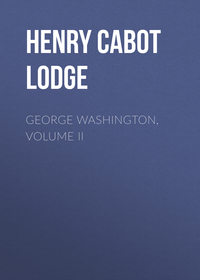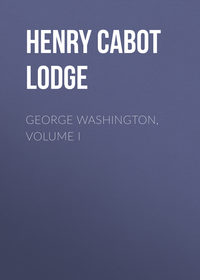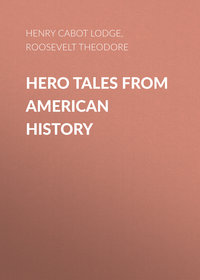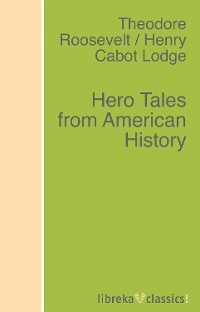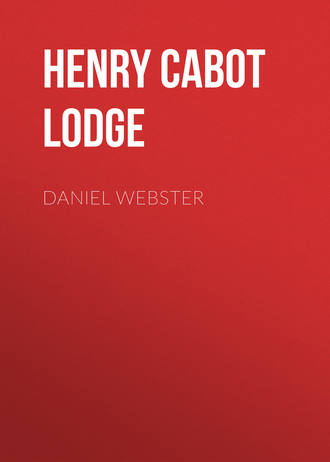 полная версия
полная версияDaniel Webster
Hamlet's words are a perfect picture of Mr. Webster's outer man, and we have but to add to the description a voice of singular beauty and power with the tone and compass of an organ. The look of his face and the sound of his voice were in themselves as eloquent as anything Mr. Webster ever uttered.
But the imposing presence was only the outward sign of the man. Within was a massive and powerful intellect, not creative or ingenious, but with a wonderful vigor of grasp, capacious, penetrating, far-reaching. Mr. Webster's strongest and most characteristic mental qualities were weight and force. He was peculiarly fitted to deal with large subjects in a large way. He was by temperament extremely conservative. There was nothing of the reformer or the zealot about him. He could maintain or construct where other men had built; he could not lay new foundations or invent. We see this curiously exemplified in his feeling toward Hamilton and Madison. He admired them both, and to the former he paid a compliment which has become a familiar quotation. But Hamilton's bold, aggressive genius, his audacity, fertility, and resource, did not appeal to Mr. Webster as did the prudence, the constructive wisdom, and the safe conservatism of the gentle Madison, whom he never wearied of praising. The same description may be given of his imagination, which was warm, vigorous, and keen, but not poetic. He used it well, it never led him astray, and was the secret of his most conspicuous oratorical triumphs.
He had great natural pride and a strong sense of personal dignity, which made him always impressive, but apparently cold, and sometimes solemn in public. In his later years this solemnity degenerated occasionally into pomposity, to which it is always perilously near. At no time in his life was he quick or excitable. He was indolent and dreamy, working always under pressure, and then at a high rate of speed. This indolence increased as he grew older; he would then postpone longer and labor more intensely to make up the lost time than in his earlier days. When he was quiescent, he seemed stern, cold, and latterly rather heavy, and some outer incentive was needed to rouse his intellect or touch his heart. Once stirred, he blazed forth, and, when fairly engaged, with his intellect in full play, he was as grand and effective in his eloquence as it is given to human nature to be. In the less exciting occupations of public life, as, for instance, in foreign negotiations, he showed the same grip upon his subject, the same capacity and judgment as in his speeches, and a mingling of tact and dignity which proved the greatest fitness for the conduct of the gravest public affairs. As a statesman Mr. Webster was not an "opportunist," as it is the fashion to call those who live politically from day to day, dealing with each question as it arises, and exhibiting often the greatest skill and talent. Still less was he a statesman of the type of Charles Fox, who preached to the deaf ears of one generation great principles which became accepted truisms in the next. Mr. Webster stands between the two classes. He viewed the present with a strong perception of the future, and shaped his policy not merely for the daily exigency, but with a keen eye to subsequent effects. At the same time he never put forward and defended single-handed a great principle or idea which, neglected then, was gradually to win its way and reign supreme among a succeeding generation.
His speeches have a heat and glow which we can still feel, and a depth and reality of thought which have secured them a place in literature. He had not a fiery nature, although there is often so much warmth in what he said. He was neither high tempered nor quick to anger, but he could be fierce, and, when adulation had warped him in those later years, he was capable of striking ugly blows which sometimes wounded friends as well as enemies.
There remains one marked quality to be noticed in Mr. Webster, which was of immense negative service to him. This was his sense of humor. Mr. Nichol, in his recent history of American literature, speaks of Mr. Webster as deficient in this respect. Either the critic himself is deficient in humor or he has studied only Webster's collected works, which give no indication of the real humor in the man. That Mr. Webster was not a humorist is unquestionably true, and although he used a sarcasm which made his opponents seem absurd and even ridiculous at times, and in his more unstudied efforts would provoke mirth by some happy and playful allusion, some felicitous quotation or ingenious antithesis, he was too stately in every essential respect ever to seek to make mere fun or to excite the laughter of his hearers by deliberate exertions and with malice aforethought. He had, nevertheless, a real and genuine sense of humor. We can see it in his letters, and it comes out in a thousand ways in the details and incidents of his private life. When he had thrown aside the cares of professional or public business, he revelled in hearty, boisterous fun, and he had that sanest of qualities, an honest, boyish love of pure nonsense. He delighted in a good story and dearly loved a joke, although no jester himself. This sense of humor and appreciation of the ridiculous, although they give no color to his published works, where, indeed, they would have been out of place, improved his judgment, smoothed his path through the world, and saved him from those blunders in taste and those follies in action which are ever the pitfalls for men with the fervid, oratorical temperament.
This sense of humor gave, also, a great charm to his conversation and to all social intercourse with him. He was a good, but never, so far as can be judged from tradition, an overbearing talker. He never appears to have crushed opposition in conversation, nor to have indulged in monologue, which is so apt to be the foible of famous and successful men who have a solemn sense of their own dignity and importance. What Lord Melbourne said of the great Whig historian, "that he wished he was as sure of anything as Tom Macaulay was of everything," could not be applied to Mr. Webster. He owed his freedom from such a weakness partly, no doubt, to his natural indolence, but still more to the fact that he was not only no pedant, but not even a very learned man. He knew no Greek, but was familiar with Latin. His quotations and allusions were chiefly drawn from Shakespeare, Milton, Homer, and the Bible, where he found what most appealed to him—simplicity and grandeur of thought and diction. At the same time, he was a great reader, and possessed wide information on a vast variety of subjects, which a clear and retentive memory put always at his command. The result of all this was that he was a most charming and entertaining companion.
These attractions were heightened by his large nature and strong animal spirits. He loved outdoor life. He was a keen sportsman and skilful fisherman. In all these ways he was healthy and manly, without any tinge of the mere student or public official. He loved everything that was large. His soul expanded in the free air and beneath the blue sky. All natural scenery appealed to him,—Niagara, the mountains, the rolling prairie, the great rivers,—but he found most contentment beside the limitless sea, amid brown marshes and sand-dunes, where the sense of infinite space is strongest. It was the same in regard to animals. He cared but little for horses or dogs, but he rejoiced in great herds of cattle, and especially in fine oxen, the embodiment of slow and massive strength. In England the things which chiefly appealed to him were the Tower of London, Westminster Abbey, Smithfield cattle market, and English agriculture. So it was always and everywhere. He loved mountains and great trees, wide horizons, the ocean, the western plains, and the giant monuments of literature and art. He rejoiced in his strength and the overflowing animal vigor that was in him. He was so big and so strong, so large in every way, that people sank into repose in his presence, and felt rest and confidence in the mere fact of his existence. He came to be regarded as an institution, and when he died men paused with a sense of helplessness, and wondered how the country would get on without him. To have filled so large a space in a country so vast, and in a great, hurrying, and pushing democracy, implies a personality of a most uncommon kind.
He was, too, something more than a charming companion in private life. He was generous, liberal, hospitable, and deeply affectionate. He was adored in his home, and deeply loved his children, who were torn from him, one after another. His sorrow, like his joy, was intense and full of force. He had many devoted friends, and a still greater body of unhesitating followers. To the former he showed, through nearly all his life, the warm affection which was natural to him. It was not until adulation and flattery had deeply injured him, and the frustrated ambition for the presidency had poisoned both heart and mind, that he became dictatorial and overbearing. Not till then did he quarrel with those who had served and followed him, as when he slighted Mr. Lawrence for expressing independent opinions, and refused to do justice to the memory of Story because it might impair his own glories. They do not present a pleasant picture, these quarrels with friends, but they were part of the deterioration of the last years, and they furnish in a certain way the key to his failure to attain the presidency. The country was proud of Mr. Webster; proud of his intellect, his eloquence, his fame. He was the idol of the capitalists, the merchants, the lawyers, the clergy, the educated men of all classes in the East. The politicians dreaded and feared him because he was so great, and so little in sympathy with them, but his real weakness was with the masses of the people. He was not popular in the true sense of the word. For years the Whig party and Henry Clay were almost synonymous terms, but this could never be said of Mr. Webster. His following was strong in quality, but weak numerically. Clay touched the popular heart. Webster never did. The people were proud of him, wondered at him, were awed by him, but they did not love him, and that was the reason he was never President, for he was too great to succeed to the high office, as many men have, by happy or unhappy accident. There was also another feeling which is suggested by the differences with some of his closest friends. There was a lurking distrust of Mr. Webster's sincerity. We can see it plainly in the correspondence of the Western Whigs, who were not, perhaps, wholly impartial. But it existed, nevertheless. There was a vague, ill-defined feeling of doubt in the public mind; a suspicion that the spirit of the advocate was the ruling spirit in Mr. Webster, and that he did not believe with absolute and fervent faith in one side of any question. There was just enough correctness, just a sufficient grain of truth in this idea, when united with the coldness and dignity of his manner and with his greatness itself, to render impossible that popularity which, to be real and lasting in a democracy, must come from the heart and not from the head of the people, which must be instinctive and emotional, and not the offspring of reason.
There is no occasion to discuss, or hold up to reprobation, Mr. Webster's failings. He was a splendid animal as well as a great man, and he had strong passions and appetites, which he indulged at times to the detriment of his health and reputation. These errors may be mostly fitly consigned to silence. But there was one failing which cannot be passed over in this way. This was in regard to money. His indifference to debt was perceptible in his youth, and for many years showed no sign of growth. But in his later years it increased with terrible rapidity. He earned twenty thousand a year when he first came to Boston,—a very great income for those days. His public career interfered, of course, with his law practice, but there never was a period when he could not, with reasonable economy, have laid up something at the end of every year, and gradually amassed a fortune. But he not only never saved, he lived habitually beyond his means. He did not become poor by his devotion to the public service, but by his own extravagance. He loved to spend money and to live well. He had a fine library and handsome plate; he bought fancy cattle; he kept open house, and indulged in that most expensive of all luxuries, "gentleman-farming." He never stinted himself in any way, and he gave away money with reckless generosity and heedless profusion, often not stopping to inquire who the recipient of his bounty might be. The result was debt; then subscriptions among his friends to pay his debts; then a fresh start and more debts, and more subscriptions and funds for his benefit, and gifts of money for his table, and checks or notes for several thousand dollars in token of admiration of the 7th of March speech.8 This was, of course, utterly wrong and demoralizing, but Mr. Webster came, after a time, to look upon such transactions as natural and proper. In the Ingersoll debate, Mr. Yancey accused him of being in the pay of the New England manufacturers, and his biographer has replied to the charge at length. That Mr. Webster was in the pay of the manufacturers in the sense that they hired him, and bade him do certain things, is absurd. That he was maintained and supported in a large degree by New England manufacturers and capitalists cannot be questioned; but his attitude toward them was not that of servant and dependent. He seems to have regarded the merchants and bankers of State Street very much as a feudal baron regarded his peasantry. It was their privilege and duty to support him, and he repaid them with an occasional magnificent compliment. The result was that he lived in debt and died insolvent, and this was not the position which such a man as Daniel Webster should have occupied.
He showed the same indifference to the source of supplies of money in other ways. He took a fee from Wheelock, and then deserted him. He came down to Salem to prosecute a murderer, and the opposing counsel objected that he was brought there to hurry the jury beyond the law and the evidence, and it was even murmured audibly in the court-room that he had a fee from the relatives of the murdered man in his pocket. A fee of that sort he certainly received either then or afterwards. Every ugly public attack that was made upon him related to money, and it is painful that the biographer of such a man as Webster should be compelled to give many pages to show that his hero was not in the pay of manufacturers, and did not receive a bribe in carrying out the provisions of the treaty of Guadaloupe-Hidalgo. The refutation may be perfectly successful, but there ought to have been no need of it. The reputation of a man like Mr. Webster in money matters should have been so far above suspicion that no one would have dreamed of attacking it. Debts and subscriptions bred the idea that there might be worse behind, and although there is no reason to believe that such was the case, these things are of themselves deplorable enough.
When Mr. Webster failed it was a moral failure. His moral character was not equal to his intellectual force. All the errors he ever committed, whether in public or in private life, in political action or in regard to money obligations, came from moral weakness. He was deficient in that intensity of conviction which carries men beyond and above all triumphs of statesmanship, and makes them the embodiment of the great moral forces which move the world. If Mr. Webster's moral power had equalled his intellectual greatness, he would have had no rival in our history. But this combination and balance are so rare that they are hardly to be found in perfection among the sons of men. The very fact of his greatness made his failings all the more dangerous and unfortunate. To be blinded by the splendor of his fame and the lustre of his achievements and prate about the sin of belittling a great man is the falsest philosophy and the meanest cant. The only thing worth having, in history as in life, is truth; and we do wrong to our past, to ourselves, and to our posterity if we do not strive to render simple justice always. We can forgive the errors and sorrow for the faults of our great ones gone; we cannot afford to hide or forget their shortcomings.
But after all has been said, the question of most interest is, what Mr. Webster represented, what he effected, and what he means in our history. The answer is simple. He stands to-day as the preëminent champion and exponent of nationality. He said once, "there are no Alleghanies in my politics," and he spoke the exact truth. Mr. Webster was thoroughly national. There is no taint of sectionalism or narrow local prejudice about him. He towers up as an American, a citizen of the United States in the fullest sense of the word. He did not invent the Union, or discover the doctrine of nationality. But he found the great fact and the great principle ready to his hand, and he lifted them up, and preached the gospel of nationality throughout the length and breadth of the land. In his fidelity to this cause he never wavered nor faltered. From the first burst of boyish oratory to the sleepless nights at Marshfield, when, waiting for death, he looked through the window at the light which showed him the national flag fluttering from its staff, his first thought was of a united country. To his large nature the Union appealed powerfully by the mere sense of magnitude which it conveyed. The vision of future empire, the dream of the destiny of an unbroken union touched and kindled his imagination. He could hardly speak in public without an allusion to the grandeur of American nationality, and a fervent appeal to keep it sacred and intact. For fifty years, with reiteration ever more frequent, sometimes with rich elaboration, sometimes with brief and simple allusion, he poured this message into the ears of a listening people. His words passed into text-books, and became the first declamations of school-boys. They were in every one's mouth. They sank into the hearts of the people, and became unconsciously a part of their life and daily thoughts. When the hour came, it was love for the Union and the sentiment of nationality which nerved the arm of the North, and sustained her courage. That love had been fostered, and that sentiment had been strengthened and vivified by the life and words of Webster. No one had done so much, or had so large a share in this momentous task. Here lies the debt which the American people owe to Webster, and here is his meaning and importance in his own time and to us to-day. His career, his intellect, and his achievements are inseparably connected with the maintenance of a great empire, and the fortunes of a great people. So long as English oratory is read or studied, so long will his speeches stand high in literature. So long as the Union of these States endures, or holds a place in history, will the name of Daniel Webster be honored and remembered, and his stately eloquence find an echo in the hearts of his countrymen.
1
Mr. Mason, as is well known, was six feet seven inches in height, and his language, always very forcible and direct, was, when he was irritated, if we may trust tradition, at times somewhat profane.
2
Mr. Peter Harvey, in his Reminiscences (p. 122), has an anecdote in regard to Webster and Pinkney, which places the former in the light of a common and odious bully, an attitude as alien to Mr. Webster's character as can well be conceived. The story is undoubtedly either wholly fictitious or so grossly exaggerated as to be practically false. On the page preceding the account of this incident, Mr. Harvey makes Webster say that he never received a challenge from Randolph, whereas in Webster's own letter, published by Mr. Curtis, there is express reference to a note of challenge received from Randolph. This is a fair example of these Reminiscences. A more untrustworthy book it would be impossible to imagine. There is not a statement in it which can be safely accepted, unless supported by other evidence. It puts its subject throughout in the most unpleasant light, and nothing has ever been written about Webster so well calculated to injure and belittle him as these feeble and distorted recollections of his loving and devoted Boswell. It is the reflection of a great man upon the mirror of a very small mind and weak memory.
3
My brief statement is merely a further condensation of the excellent abstract of this speech made by Mr Curtis.
4
A volume might be written comparing Mr. Webster with other great orators. Only the briefest and most rudimentary treatment of the subject is possible here. A most excellent study of the comparative excellence of Webster's eloquence has been made by Judge Chamberlain, Librarian of the Boston Public Library, in a speech at the dinner of the Dartmouth Alumni, which has since been printed as a pamphlet.
5
Congressional Globe, 31st Congress, 1st Session, p. 203.
6
Ibid., Appendix, p. 510.
7
Mr. Curtis says a "great majority continued to divide their votes between Mr. Fillmore and Mr. Webster." The highest number reached by the combined Webster and Fillmore votes, on any one ballot, was 162, three more than was received on the last ballot by General Scott, who, Mr. Curtis correctly says, obtained only a "few votes more than the necessary majority."
8
The story of the gift of ten thousand dollars in token of admiration of the 7th of March speech, referred to by Dr. Von Holst (Const. Hist. of the United States) may be found in a volume entitled, In Memoriam, B. Ogle Tayloe, p. 109, and is as follows: "My opulent and munificent friend and neighbor Mr. William W. Corcoran," says Mr. Tayloe, "after the perusal of Webster's celebrated March speech in defence of the Constitution and of Southern rights, inclosed to Mrs. Webster her husband's note for ten thousand dollars given him for a loan to that amount. Mr. Webster met Mr. Corcoran the same evening, at the President's, and thanked him for the 'princely favor.' Next day he addressed to Mr. Corcoran a letter of thanks which I read at Mr. Corcoran's request." This version is substantially correct. The morning of March 8 Mr. Corcoran inclosed with a letter of congratulation some notes of Mr. Webster's amounting to some six thousand dollars. Reflecting that this was not a very solid tribute, he opened his letter and put in a check for a thousand dollars, and sent the notes and the check to Mr. Webster, who wrote him a letter expressing his gratitude, which Mr. Tayloe doubtless saw, and which is still in existence. I give the facts in this way because Mr. George T. Curtis, in a newspaper interview, referring to an article of mine in the Atlantic Monthly, said, "With regard to the story of the ten thousand dollar check, which story Mr. Lodge gives us to understand he found in the pages of that very credulous writer Dr. Von Holst, although I have not looked into his volumes to see whether he makes the charge, I have only to say that I never heard of such an occurrence before, and that it would require the oath of a very credible witness to the fact to make me believe it." I may add that I have taken the trouble not only to look into Dr. Von Holst's volumes but to examine the whole matter thoroughly. The proof is absolute and indeed it is not necessary to go beyond Mr. Webster's own letter of acknowledgment in search of evidence, were there the slightest reason to doubt the substantial correctness of Mr. Tayloe's statement. The point is a small one, but a statement of fact, if questioned, ought always to be sustained or withdrawn.


